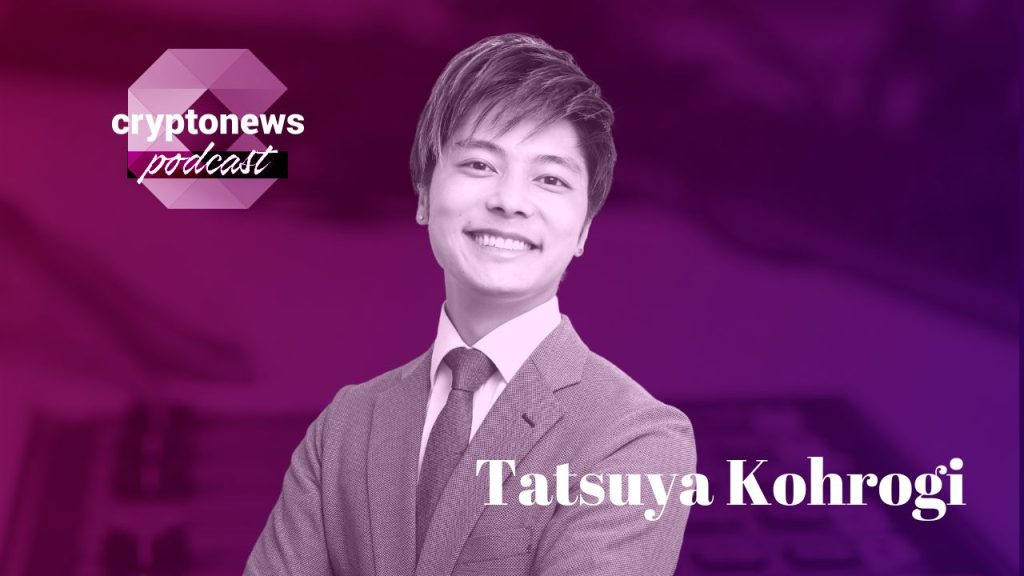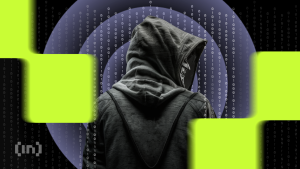Tatsuya Kohrogi, SCO of Digital Entertainment Asset, on Web3 in Japan & Decentralizing Game Development

In an exclusive interview with cryptonews.com, Tatsuya (Tats) Kohrogi, SCO of Digital Entertainment Asset, talks about fundraising challenges during the crypto winter, P2E/P&E regulatory insights in Japan, and wow the growing Web3 gaming industry will help bring Web3 into the mainstream.
About Tatsuya “Tats” Kohrogi
Tatsuya (Tats) Kohrogi is the Chief Strategy Officer and Head of Global Business for Digital Entertainment Asset, also known as DEA. Tats is responsible for leading the company’s global operations. He has an extensive background in sales, marketing, business development, and startup management. Prior to joining the company, he was a senior partner manager at Meta managing business partnerships for the Japan market, based in APAC HQ in Singapore.
Prior to Meta, Tats worked with Softbank in Tokyo. He held several leadership roles in sales, digital marketing, investment strategy, portfolio management, and new business development. During his time at SoftBank, Tats co-founded an internal ad-tech service that received funding from SoftBank’s internal venture program. Tats was also part of Son Masayoshi’s successor program, SoftBank Academia. He took part in CEO projects and learned management philosophy directly from Masa for three years.
Tatsuya Kohrogi gave a wide-ranging exclusive interview which you can see below, and we are happy for you to use it for publication provided there is a credit to www.cryptonews.com.
Highlights Of The Interview
Using a buyback program to stabilize a token economy during volatile market conditionsFundraising challenges during the crypto winter and bear marketP2E/P&E regulatory insights in Japan and beyondHow the growing Web3 gaming industry will help bring Web3 into the mainstreamHow PlayMining is decentralizing the game development process



Full Transcript Of The Interview
Matt Zahab Ladies and gentlemen, welcome back to the Cryptonews Podcast. We are buzzing as always coming in half from Mexico and our guest is coming in hot 13 hours ahead of me from beautiful Singapore. Today we have Tatsuya Kohrogi also known as Tats, who is the Chief Strategy Officer and Head of Global Business for Digital Entertainment Assets also known as DEA. Tats has an extensive background in sales, marketing bizdev and startup management. Prior to joining the company, he was a senior partner manager at the one and only Meta managing business partnerships for the Japan market based in APAC HQ in Singapore. Tats also worked for another one and only SoftBank ever heard of him, where he held several leadership roles in sales, digital marketing, investment strategy, portfolio management, and new bizdev. Super pumped. Tats, it’s been a hot minute pumped to have you on man. Welcome to the show.
Tats Kohrogi Thanks for having me, Matt.
Matt ZahabWe got to start with day one here. Our listeners absolutely love the stories from Meta. I believe you might be the first guest to have had some experience at SoftBank. We’d love stories on the Cryptonews Podcast. You have any crazy stories for us from your days at either Meta or SoftBank.
Tats Kohrogi There are too many. I mean, I joined SoftBank, back in 2014, before the SoftBank Vision Fund was a thing, Masa before his global presence was big. But he always has this successor program where he mentors, upcoming entrepreneurs, and handpicks, about 200 per year. And so he has this program where every year everyone’s caught competing to learn directly from Masa. And what he does is he gives us like, real life problems to solve that he’s thinking about in real time, and makes us come up with an idea and pitch for it. And so that’s something called SoftBank Academia. Everyone, if you’re interested in learning something about that you could Google it, but I was part of that for three years. And some of the craziest projects were from SoftBank Academia as well. So that’s just a quick intro just. Nothing too juicy. But I think that’s something very unique of SoftBank and Masa as well.
Matt Zahab Any takeaways from working with Masa? Like any piece of advice that he’d give you? Or just the way he conducted business. Perhaps his nonverbal communication, verbal communication, whatever it may have been, but what were the things that really stood out where you’re like, damn, I gotta steal this from this dude.
Tats Kohrogi Yeah, there’s something that so I come from the US as well. So like, I have that Western background. But the Eastern management philosophy, there’s a lot of things that aren’t really translated in English. So I mean, Art of War is very popular in the US. Right?
Matt Zahab Classic.
Tats Kohrogi Masa created his own version. So using traditional Chinese characters, you can Google it, yeah, it’s crazy. There’s a graph.
Matt Zahab Is it good?
Tats Kohrogi It’s really good. And each character represents for like, how to manage a specific situation in business. And this is something I think is very, like underrated, like not many people know about this in the Western world. And I see on their SoftBank Group page recently, they’ve been posting a little bit about it online in English. But some of these management philosophies coming from Masa is very unique. And I think worth looking into the if any entrepreneurs or even business people, if you’re interested in that, that’s something worth looking into.
Matt Zahab Interesting. And Meta was the Eastern Meta similar to the Western Meta where, you know, very sought after graduates are getting jobs working pretty hard for six to 12 months and then just mailing it in forever and just using the company for the gourmet breakfast, lunch dinners, free gyms, massages, the whole nine yards was there any similarities in that?
Tats Kohrogi So I mean, I was in that during the COVID period. So I was a little over two years. So it is probably different from pre-COVID.
Matt Zahab Right.
Tats Kohrogi But yeah, definitely, the perks are amazing. Like, once you leave you understand how like valuable, like the food is right? And the facilities and the people and culture are very unique. But I’d say you know, depending on the regions, it’s not that different. I mean, it’s very open to culture and diversity and inclusion as well. So each office has a different taste if you go travel to different parts of the countries, but yeah, definitely like SoftBank, Meta, Facebook, very different cultures, but both was very aligned with I personally believe that mission wise.
Matt Zahab One, again, I could be incredibly wrong on this, but I heard a crazy hot take once about Meta and why they give so many perks to their employees, and also why they pay so much. And it’s not even so much about employee retention, it’s just to bring the taxes down. Because obviously, the more you spend, the more expenditures you have, the less taxes you pay. Again, I don’t know if that’s true, but like, it could sort of make sense if each employee is, you know, getting the equivalent of $80 a day in food, plus their $350,000 salary, like, what do you think about that?
Tats Kohrogi Honestly, I’m not in a position to talk about it. So like, I don’t know if that’s the strategy or not makes sense, in a way. But yeah, I think it has more to do with taking care of the employees as well, to make sure like, everything’s there.
Matt Zahab Yeah. keep everyone happy. Nice. Yeah. Let’s jump into crypto. Let’s start with fundraising. Now. You guys raised 10 million US dollars, 10 mil greenbacks from LA based LDA Capital. And that was during a pretty, you know, tumultuous time. How could you sort of speak about the fundraising challenges in a crypto bear market or crypto winter?
Tats Kohrogi I mean, yeah, this is like, overall macro, not just crypto, I think its pretty tough. It’s still tough market right now. So, you know, we’ve been fundraising for a while. And like, even then we had to pull back a bit restructure how we approach things. And you know, VCs are pulling out and depending on the region to with the whole FTX incidents, in November, like a lot of the global investors are impacted directly, the crypto investors are impacted directly. So a lot of those investors are pulling back and everyone’s kind of observing. While you know, how we were able to approach this was that, you know, we have the traction, we have the revenue. So we’re lucky in the sense that we’re still able to get the traction from investors based on our actual revenue and traction.
Matt Zahab There are super interesting thing that you and the team have done at DEA is the market expansion, just like a crazy penetration into Asia? This is something that I’ve always been so curious about. As someone who has very little experience with Asian business, how do you how do you penetrate that market? Because with the massive, you know, sort of glass giants, as they’re called these huge conglomerates that, like the WeChat, that just have so many verticals, and they’re so powerful, like how do you get in in any capacity? Any stories, tips, tricks, piece of advice, like how did you guys do it?
Tats Kohrogi Yeah. I think a lot of it comes down to our co-founders as well, and their track record and their experience. So one of our co-founder, he goes by Goro. His first name is Naohito Yoshida, but he’s a three times Serial Entrepreneur IPL three companies in the Tokyo Stock Exchange. So he’s an entrepreneurial veteran, so he has that network as well. And also the other co-founder is a he goes by Kozo. Kozo Yamada is his full name, but he has experience in the entertainment industry over 15 plus years working for TV Tokyo. And so those two combined had that experience and network from the beginning, which kind of gave us that edge. And DEA has been around since 2018. So when Blockchain was first being conceptualized as like, okay, Crypto, DeFi, Cryptocurrency. That’s when Goro was thinking, Okay, well, if we can actually earn real money in the games we play, and like, how amazing would that be was like is very simple thought process. And two years before 2018, the chairman of Sony ex-chairman, Mr. Idei, he was the one time a lot of the entrepreneurs in Japan at the time, like go into Blockchain, study it because that’s the future. And that was seven years ago.
Matt Zahab This was the ex-chairman of Sony, who was saying this?
Tats Kohrogi Yes, extremity, Sony was telling all the Japanese entrepreneurs at the time look into it, do it. And really not many of people took his advice. But Goro looked into it. And at the time, Japan’s regulations were very tough to create a Token Project, mainly under taxation regulations. So the only place to really do at that time in 2018, was in Singapore. So he came out created this Token Project proposal and ran with it developed and we released our first game titles in early 2020. And that’s kind of the history aspect of it, but like how to penetrate in it. I think it helped that, you know, we had the founders with the existing network in Japan, and because they came from the entertainment and creative industry, we had this network of like Anime and Manga creators, and in Japan, Anime Manga is huge and globally as well. It’s big. So I think that was one of our big entry into Asia as we had that edge of Anime and Manga creators working with us on our platform.
Matt Zahab Before we wet into a more specific and dialed in approach on micro-Japan. Anime it’s so powerful, me personally, I’ve never understood it. It’s just something that doesn’t really tickle my fancy I totally get it. I have friends for you know, from Toronto, Canada, who absolutely love it. And I get it, but I don’t like, can you? And this is such a tough one. But what in particular really gets the Japanese people going about anime? Like what is it if you could just sort of distill it to a couple different things?
Tats Kohrogi Yeah, I mean, I think I can say it’s not just Japanese people, it’s global as well. Like, half the Anime industry is made up of global revenue right now. But Japan has it has very deep roots in this like Manga, Anime, artistry, craftsmanship, historically. So I mean, we’re all visual learners. So instead of just reading text, seeing a visual like comics, right, like reading comics as a kid, we like to see the visuals see the words and in take story that way. And in the States, you know, growing up reading comics is kind of like a children’s thing to do, right? Yeah. And like, in Japan, though, like a lot of the themes are even adult themes, or, you know, higher education topics, or tough like finance education topics will be written in the Anime/Manga style. So I think it’s just the adoption. And every kid in Japan at one point wants to become a Manga artist is something that one of our co-founders saying, but it’s true, like we all draw, we all grow up with it, and we learn through Manga. So I think being you know, Japanese ethnicity growing up in the States, I read a lot of Manga as well and watch a lot Animate to input Japanese. So I think culturally, it has a very significant part to it. And because it’s been translated and shipped out globally, a lot of the global audiences really latching on to it as well.
Matt Zahab That’s so cool. Thanks for that. That really did help it feel like we got a little bit of a better understanding. Now let’s jump back into Japan and crypto. Just like you said, a couple of years ago, Japan had some of the tightest Crypto, Blockchain, Web3 regulations on the planet, it was nightmare fuel doing anything building related in a push the lot of incredible teams, firms, creators out of Japan, and over to Singapore and Dubai and the other places in the world that are much more lenient and have much more open rules, laws and regulations. But recently, Japan has been a leader in loosening these rules, these regulations. And a lot of that has to do with sort of the, you know, Token Project, taxation and listing regulations. And I’d love if you could speak to this and just sort of let our listeners know what exactly, you know, Japan is doing to be a front runner in the space.
Tats Kohrogi Yeah, it’s strange, because everything just kind of flipped. Last, like H2 of 2022. So the past couple of years, a lot of the project founders that left Japan to create Token Projects, have been lobbying with the Japanese Government. And, you know, our co-founders as well. But someone that’s been very vocal and has been kind of face of Web3 Japan, has been Sota Watanabe. And he’s one of the 30, under 30, for Forbes, founder of Astar. And the dialogue has been going for years and FTX happened and everything that’s been discussed in Japan, regulatory wise, slowly, they’re like, Okay, we need to make sure we don’t fall behind, compared to like how we did back in like Web2. So the government has created a party to really work with this. And the biggest part was the taxation regulation that I mentioned earlier as well, that created a lot of hurdles. There’s still another big one as well, which is auditing firms. So the auditing regulations, there’s still hurdles in that in Japan. But what’s another big news for Japan is that the big gaming companies in Japan are coming in. So I think it’s been big news past month or when, in beginning of the year, Square Enix released the announcement about how they’re implementing Blockchain as one of the core strategies in their business. So regulations are loosening up and large corporations are coming in and testing, Web3 technology, Blockchain technologies, and also funding is coming as well. So one of the government funded largest telco company NTT is creating a $4 billion fund to enhance the infrastructure for Web3, like wallets, infrastructure, and just everything in the space.
Matt Zahab Four billion? Billion with a B?
Tats Kohrogi Four billion, with a B, yeah, so I think, you know, we need certain things in place for and industry to really start growing. And that’s like funding, regulatory support, and corporations coming in to build. So it’s been no small startups and entrepreneurs rallying for it for the past few years. And slowly we’re seeing these regulatory funding and large corporations onboarding into the Blockchain space. So, yeah, 2023 we’re gonna start seeing a lot more interesting use cases coming up, I think in Japan. So before we’re way behind, but now I think it’s given Japan an opportunity to lead the way.
Matt Zahab Wow, that’s crazy news. Like, again, I thought, perhaps I just got to get back in the game. But like, Man, oh, man, I didn’t even know that like that should have been on every massive, reputable Cryptonews outlet. Like that’s big news, a $4 billion influx of funds by is that state owned? Or is that a private?
Tats Kohrogi Its a state owned.
Matt ZahabRight.
Tats Kohrogi So it’s a public company, but the government backs it. It’s the biggest telco company in Japan. So if you did type in NTT fund for Web3, I think it’ll come up. But that was just announced last year. But big news.
Matt Zahab Crazy. Let’s jump into you guys. Now. The name sort of says it all Digital Entertainment Asset. You guys do a whole lot of everything. And specializing in you know, Web3 Decentralized game Development. Before we get into the weeds and into the nitty gritty give me a very quick overview of what you and the team do and what you guys are working on at the moment.
Tats Kohrogi Yes, so right now our core business is the GameFi platform called PlayMining. And we have multiple games that are live that are all Blockchain Play-to-Earn games. And we also have a Metaverse business called the PlayMining Verse, where we have creators co create worlds with the community. So these two entertainment businesses is our core business right now. We have a utility token called DEAPcoin, or ticker symbol, (D-E-P) DEP. And that’s the single token. And that is a token that’s used within the PlayMining Ecosystem. So these three are like our core business, in this sense, managing the token economy and creating games and creating worlds
Matt Zahab One thing that, uh, when I was doing research to the show, I was like, Whoa, this is crazy. The Buyback Program. You guys have a world class Buyback Program that stabilizes the token economy during volatile market periods, literally, like right now telling you about this the DEP Buyback Program. Why did you implement it? And how do you make it stay afloat? Like how do you keep this? How do you keep this engine running?
Tats Kohrogi So to clarify, it’s new, we just announced this in the beginning of January. And so we haven’t really done the Buyback yet initiative. But we’ve implemented this to make sure that we can create a sustainable token economics for Play-and-Earn. So I think Play-and-Earn, like extra earn in general is a big boom, last year. And, you know, we saw like some Axie to step in, and we saw the pump and then the crash as well. And industry wise, you know, there’s a lot of sentiment like, okay, Play-to-Earn is not sustainable. And extra earn is not sustainable. There’s no sustainable model for this. But we’re doubling down on it. And we believe that Play-to-Earn model is the future. And so I think that’s just the counter narrative to a lot of other narratives out there as well in GameFi. So it just depends on who you’re targeting, and what kind of games you’re doing to. But going back to the Buyback Program. The Buyback Program, we announced that up to 40%, of like cash, Fiat revenue we get, we will Buyback our tokens. So it’ll be deflationary in that way. And so it will give an opportunity for the community investors and players to get that profit back, right, and the return on investment and deep as well. So it’s just one mechanics that we’re implementing in the token economics, and there’s just other elements we’ll be implementing as well, to make sure that we can keep growing the economy as a whole.
Matt Zahab It’s, uh, yeah, it’s just it’s so interesting. And I’m sort of, you know, going into the paper and the. It’s just, there’s so much fud with anything that seems I don’t want to say it’s too good to be true, because it’s not and obviously you guys are showing where the funds come from, but just with the whole FTX, Luna, with every other crash that happened 99, almost 100% of those came from greed. And again, this isn’t something greedy. It’s just, it’s nice. It’s refreshing to see a Buyback Program where you guys are showing how the consumer is getting their kickback. You know what I mean? Like it’s refreshing a lot of the time it’s like, earn 6% interest. We’re not going to tell you how you get this is like it’s the laid out for you flat, you know?
Tats Kohrogi Yeah, so I want to make it clear as well that like, because we have a Token Project and we sell our NFTs and our token, a lot of our revenue comes in with our DEAPcoin. But we are implementing Fiat payments as well into our endgame items and NFTs. So, with our DEAPcoin purchases, we’re going to, it’s not going to count towards the Buyback. Incentive the pool, majority of the max 40% of the Buyback pool will come from all the cash revenue coming from the company. So it’s balanced between the both and mate looking at the market situation and stabilizing the market or the token price as well. So that’s something we still got to figure out and work on. But I’m excited for the program.
Matt Zahab Tats were going to take a quick break. Gotta give a huge shout out to our sponsor the show PrimeXBT and when we get back, we’re going to talk about how play mining is decentralizing the game development process and how the Web3 gaming industry will help bring Web3 into mainstream. Till we get into that huge shout out to our sponsor the show PrimeXBT, longtime friends of Cryptonews.com. We’d love them. They are incredible people who have developed a robust trading system for both beginners and professional traders. It doesn’t matter if you’re a rookie or have that you can easily design and customize your layouts and widgets to best fit your trading style. PrimeXBT also blessing the listeners of the Cryptonews Pod with a huge promo. The promo code is CRYPTONEWS50 to receive 50% of your deposit credited to your trading account. Again, that is five zero 50% of your deposit credited to your trading account and the promo code is CRYPTONEWS50. Now back to the show with Tats. Let’s go right in to PlayMining. This is the gaming arm that is decentralizing the game development process. You guys are empowering creators. You guys have a multitude of games. And there are tons of problems sort of with the traditional creative IP industry. It’s way to centralize all the top-down narratives. All the fun and all the cake goes to the boys and gals at the top, there’s very little innovation, you guys are making moves in the space moving and grooving. I’d love to hear more about this.
Tats Kohrogi Awesome. Thank you Matt for mentioning that. Just to give you some context, our PlayMining ecosystem consists of three stakeholders, the creators, we have the investors/gaming guilds. And we also have the players. So these three stakeholders are all in the ecosystem. And I think what’s unique about the PlayMining ecosystem is that we have creator empowerment initiatives, where we have 100 plus famous Anime, Manga creators, and recently not just famous, we have community fan artists that have been voted to create NFTs on behalf of us. So how we’re one way of decentralizing the content creation processes that we bring on these creators to create these characters in game for us. And we the community votes, okay, the creator created four prototypes, A, B, C, and D, which one do you want to pick? And they’ll have like a initiative where we have a Discord chat with the creator live answering questions, and everyone’s voting, and the one that gets voted the most get picked, and the creator will receive royalties. And also we do upfront production payments as well. So it’s, we pay for them to create it for us. And we also pay them royalties. So this is something like a new model. That’s not traditional in gaming, I believe. And I think we’re one of the only projects that have 100 plus of these famous Japanese artists in our network. And yeah, we’re proud to say we paid out royalty of over 9 million Sing dollars, which is close to over 7 million USD in the past two years.
Matt Zahab How did you get all those artists on board?
Tats Kohrogi So we just contacted them from our production team, and also from existing networks, from the very getgo of our development phase, like that’s,
Matt Zahab That’s like, those are some big boy numbers right there. That’s not, that’s not a walk in the park.
Tats Kohrogi So I think it’s interesting, I got to talk to some of the creators in person in Japan recently last year as well. But um, you know, they’re very excited about this process of like Web3 game development, co creating, or it’s a new experience. And what’s been a game changer for these creators has been that the global reach. So a lot of these creators can only speak Japanese and have been limited to the studios they work with. And, you know, I talked to some of the artists that made some of these famous monsters but you know, years down the road, they don’t get any royalties for it. So even working now to recreate these characters. It did not really incentivize; they want to do something new. And another creator episode case study has been, you know, she’s a teacher. But she does drawing as a hobby. And she started playing our games, and she likes the character. So she created a fan art and posted it on Twitter. And then it went viral in our community. And it was shown to our CEO and right away did decide to do a collab. And within a month, she created her first NFT on our games. So this is just one way that we’ve been, like, decentralizing that creation process and empowering creators. And another one that I want to talk about. This is more on the game side, we’re releasing this game called Soul Fusers, which is like a monster game. And these monsters are actually being co-created with the producers and the community members. So the community members are creating ideas for monsters, and creating a sketch and posting it in the Discord groups. And the ones that get chosen will get finalized and made into characters. And in the smart contract, the ID of the creator will be listed on their name. And also they will get royalties for the monsters that they created. It’s like imagine being a fan, right?
Matt ZahabSo cool.
Tats Kohrogi Like Pokemon or something. And like, You’re, like, you created one of the Pokemon back in the days, and, you know, it exists as a fan, right? Like, that’s something that’s never been done. And I think I’m really excited about that.
Matt Zahab That’s such a big value prop to get people in, you know, like, it’s tough. There’s so many, there’s so many hooks and poles nowadays in every aspect of life. And that’s like when you can bring someone in to an ecosystem in which they’re passionate about and actually provide a very appeasing opportunity to join. That’s just like, it’s tough to turn down. I love that. That’s so cool. Let’s jump into Web3 gaming as a whole sort of the macro aspect. You guys have, you know, on boarded a lot of non-gamers into the Web3 space, you guys have also chatted with a lot of famous artists and have got them into the Web3 space, AAA game developers massive conglomerates, what are these conversations sound like? How do you guys bring them in? Are there any, you know, buzzwords or any? Anything sticky? That really gets them in the door?
Tats Kohrogi Yes. For the AAA games, like we’ve talked to a lot in the past, but we’re not working directly with them right now. I’d say that. Clearly, we’ve done like a lot of brainstorm sessions gave them ideas of what we’re doing. But it’s been quite different of what they’re trying to do as a AAA title, like existing game studio as well. So I think what we’re going to be seeing in 2023 will be these mega game studios, doing small like POC Proof of Concepts of Blockchain games. So you’ll see them come to something quick or fast to test out something right. And then after that, we’re estimating probably like in two years, so by 2025, they’re gonna go probably all in it’s still there’s no really AAA hit title Blockchain game out there yet created by the existing game studios. But the some of the keywords like you mentioned were like Blockchain games and NFTs, Play-and-Earn, Play-to-Earn. But I think what from what I’ve heard, the bigger game studios aren’t really focused on the Play-and-Earn aspect.
Matt Zahab Right, but we’re still mad early.
Tats Kohrogi Yeah.
Matt Zahab 2025, jeez, the floodgates will open. I mean, I’d love to see that. Tats, this has been a treat man. This is been tons of fun. We always have a segment on the show called the hot take factory. This is where you and I jump in and put a big old shit kickin boots on and let a couple of hot takes fly. This doesn’t have to be crypto related. It can be health, wealth, happiness, finance, space, AI, food, politics, sports, you name it, give me a couple Tats hot takes that only you really believe in, whereas most other people do not choose.
Tats Kohrogi This is gonna sound like you know, work related, like self promotion related. But recently, the narrative I’ve been seeing and hearing around, you know, the Blockchain games is you know, the Play-to-Earn is dead. Right. But like, being the person in it, I still believe in it. I see it. The insights are there, a lot of non-gamers are coming into it. There’s a lot of potential Play-to-Earn. So my hot take apologies that it’s, you know, work related, but I think it’s that Play-to-Earn is the future. It’s still early. It’s, it’s going to be cracked. And I think a lot of narrative right now that I want to put out too is that a lot of narratives focused on the AAA titles creating fun games, and, you know, all AAA titles. Yes, it’s focused on existing gamers, like hardcore gamers, mid core gamers. And I think the growth for Blockchain game and Web3 adoption is going to come from these non-gamers as well. There’s this big pie for existing targeting existing gamers, but at the same time, there’s this different pie over here, where there’s gonna be a lot of people looking for the casual, and really easy to play and enjoy on a smaller scale. And I’m a firm believer in that. And I think that’s our core target for PlayMining. And that’s my hot take right now in what I’m doing.
Matt Zahab I agree with you in the sense that I do think there’s definitely a future for Play-to-Earn. But I think the term I don’t like the term played around anymore, because so many people, again, it’s like, in today’s day and age, people don’t do research anymore, right? They act on fear and greed, they act on emotion on FOMO. They hear about this new Play-to-Earn phenomenon, and they want to invest in projects. And there was, you know, billions of dollars that hundreds of billions of dollars that were lost, but you know, probably just been played are and maybe not hundreds of billions, but definitely billions, or dozens of billions. The point I’m getting up, I prefer the term like play and potentially earn where it’s like, even with the games that you guys are creating, earning isn’t the main focus, right? It’s having an incredible time within the ecosystem. And if you are a contributor to the economy to the ecosystem, you will be able to earn which is a treat. And incentivizes you joining the ecosystem. But I me personally, I just don’t like the term because again, games I feel like the primary aspect of games should always be fun. It should never be earning. Again, just you know, nitpicking here, but that’s, that’s my whole two cents on it agree with the business model, and it definitely has a future it’s here to stay. But the term I think it’s too appeasing, you know, yeah, it doesn’t quite tell the whole story.
Tats Kohrogi It’s like, you gotta grind to play, like it doesn’t work together in a way. And I completely agree that it kind of uses synonymously but Play-and-Earn and it was more of like, the recent term that’s more popular, I believe. Yeah, I completely agree on your into it.
Matt Zahab But again, it’s just like, and I haven’t played a whole lot this year. But last year, when I was incredibly curious about the whole PDE phenomenon, like I did try a lot of games and it’s just it’s a unique phenomenon being able to click a couple buttons on your computer or play a game and mind you there were no real good games out last year, but an earn some of the company or ecosystems native coin, it was just like, well, imagine when I was younger, you know, rip and Pokemon or imagine like rip and COD, being able to, to buy something and trade, you know, or, and then obviously, you have much more adaptive use cases like RuneScape, where people created offline marketplaces. And in fact, there was even in an Indian marketplace, but just super cool stuff. Tats what a treat man really appreciate you coming on. I know it’s getting late for you, and beautiful Singapore. But before we let you go, can you please let our listeners know where they can find you, PlayMining and DEA online and on socials?
Tats Kohrogi Yes. So from my social you can find me on Twitter or LinkedIn @tatsuya_kohrogi, so it’s t-a-t-s-u-y-a underscore k-o-h-r-o-g-I, and PlayMining, same on Twitter, @playmining_ sg. I guess maybe I can share the link to you. Maybe you can attach it but yeah.
Matt Zahab Yeah, sure.
Tats Kohrogi Yes. So Twitter is the best to just kind of socialize and share info to each other. I’m quite active on Twitter and LinkedIn.
Matt Zahab Tats appreciate it, man. All the best and can’t wait for round two in over the next couple months.
Tats Kohrogi Sounds good man. Thank you so much for having me
Matt Zahab Folks. What an episode with Tatsuya Kohrogi, the Chief Strategy Officer and Head of Global Business for DEA. Truly an episode learned a ton and they are making moves out East and Japan, Singapore and everywhere over there. What an episode hope you guys enjoyed this one if you did, please do subscribe. It would mean the world to my team and I enter the team love you guys. Justas you are the GOAT appreciate you as always. And to the listeners guys, thank you so much for listening. Appreciate you. Keep on growing those bags and keep on staying healthy, wealthy and happy. Bye for now, and we’ll talk soon.














